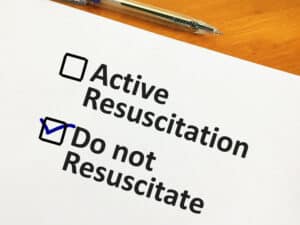Is It Advisable to Include a Do Not Resuscitate Order in Your Estate Plan?
Learn About the Importance of a Healthcare Directive with an Experienced Estate Plan Attorney
 No one enjoys talking about their mortality, much less the medical circumstances surrounding one’s passing. Many people wonder if they should include a DNR or health instructions regarding the options for medical intervention in certain circumstances. The answers are different for everyone but what remains the same is the need to have this discussion sooner than later.
No one enjoys talking about their mortality, much less the medical circumstances surrounding one’s passing. Many people wonder if they should include a DNR or health instructions regarding the options for medical intervention in certain circumstances. The answers are different for everyone but what remains the same is the need to have this discussion sooner than later.
A DNR Order and Its Implications in New Jersey
At its core, a DNR (short for Do Not Resuscitate) order is your request to medical staff not to revive you. Usually, it is for cases where CPR (cardiopulmonary resuscitation) would be used to get your heart and breathing working again. It also prevents using a defibrillator and certain medications to accelerate the pulse and prevent blood clotting. Frequently, a DNR works in conjunction with MOLST orders (Medical Orders for Life-Sustaining Treatment), including intubation, ventilation, extended coma, and dialysis. Both orders require a serious conversation between you and your doctor. They are meant to be used for someone who is elderly or has an advanced terminal illness.
The American Heart Association changed the name DNR to DNAR (Do Not Attempt Resuscitation) to make the language clearer. Although the change was made several years ago, medical health providers and insurance companies continue to use the terms interchangeably. Another term, known as AND, stands for Allow Natural Death, but it is not used as often.
Importance of Appointing a Healthcare Proxy
To designate someone to make medical decisions for you, you can have a healthcare proxy. This is someone of great confidence (usually a spouse or family member) who, if you cannot express your wishes about your medical treatment, will make those decisions for you. For example, if you were hit by a car while riding a bicycle and sustained traumatic injuries, your proxy would make the medical decisions for you until you could communicate them yourself. It is important to note that the restrictions and requirements for these directives differ in every state. Coordinating your wishes in these documents with your estate attorney is essential. It would be a tragedy for your proxy and your attorney to seek a legal order from the courts during such a stressful time.
The Impact a DNR Has on Your Estate Plan
An estate plan is made to distribute the assets of the estate owner. There are many components to an estate plan, including a will, a trust, a financial power of attorney, and healthcare directives. Your attorney and healthcare provider can help you to establish a formal document indicating the medical care you want if you are gravely ill. Your estate plan should have financial power of attorney and a healthcare proxy. If you so choose, one person can take on both roles. If you have a DNR, it would behoove you to talk with your family about your wishes. Many times, a family’s desire to keep a loved one from passing causes significant emotional unrest when a DNR hasn’t been discussed beforehand. It needs to be made clear to your family and those responsible for your care precisely what you want to happen should you die.
Once a DNR is in place, as difficult as it is for family members, it cannot be overridden. Oftentimes, the family will meet with the treating physicians, who can explain your prognosis and treatment options in detail to maintain transparency and trust while keeping the DNR order that you requested in place.
The Two Situations When a Do Not Resuscitate Order Matters
The DNR addresses two physical situations. The first is cardiac arrest—resuscitation efforts such as chest compressions, mouth-to-mouth breathing, or a defibrillator. The second is when breathing ceases entirely. This is addressed in the hospital with intubation of the trachea or assisted breathing with an air pump. If both the heart and breathing have stopped, a combination of these medical interventions will occur. Having a DNR means none of those procedures will be done.
Procedures that can be done despite having a DNR are oxygen to assist breathing, trauma care such as bleeding or exposed fractures, fluid intravenous application to prevent them from going into shock, and pain management.
For some, it may be difficult to imagine why someone would want a DNR, but many would instead make their own decisions about their healthcare rather than burden family members with that choice. If they are elderly, require a life-threatening medical procedure, or have a terminal illness, a DNR may be more of a relief to them.
 What is the Process for Requesting a DNR?
What is the Process for Requesting a DNR?
You can meet with your primary care physician and complete the necessary forms. It is essential to share your wishes with your family. Your doctor should place your DNR on file. It is also a good idea to have a medical bracelet with a DNR engraving in case you experience some emergency.
Is it Possible to Reverse a DNR Order?
Absolutely you can. If you do not want a DNR, request that your doctor and healthcare team remove the notice from your records and inform your family of the change. You should ensure that all physical DNR forms, cards, bracelets, and other identification accessories are destroyed.
Who can Help with Creating a Do Not Resuscitate Order in New Jersey?
Although you don’t need an attorney to draft a DNR, it is a good idea to meet with one to set up your estate plan, which will include an Advanced Healthcare Directive, a document that lists in detail what treatments you do and do want in case of a grave illness. To have this directive, your lawyer can help you establish an estate plan that names a power of attorney and a healthcare proxy. Serious health problems can happen to you at any time, so you should work with an experienced estate attorney who can provide the counsel you require about your estate and your wishes should you become gravely ill.
Here at The Bronzino Law Firm, our estate attorneys have worked with many clients to structure their estate plans and ensure their wishes are fulfilled. We know this is important and will work with you compassionately as we address your unique concerns. Call our offices at (732) 812-3102 or reach out to us online for a free consultation. With local offices in Brick and Sea Girt, we serve clients in Jackson, Point Pleasant, Wall, Tinton Falls, Toms River, Middletown, Asbury Park, and towns across Ocean and Monmouth County.


 What is the Process for Requesting a DNR?
What is the Process for Requesting a DNR?




